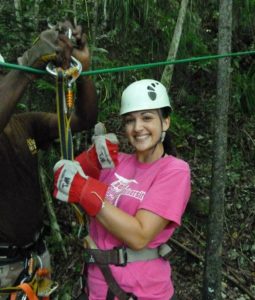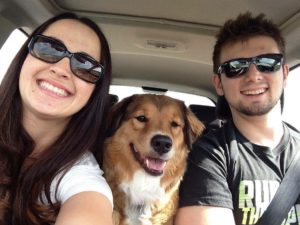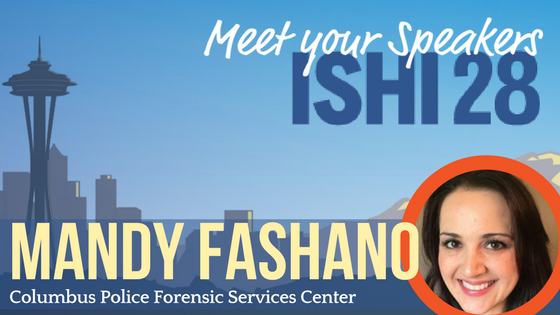The ISHI agenda is live and includes great talks from amazing speakers! While the forensic community is a tight-knit group, we can always get a little closer, right? With that in mind, we interviewed our speakers to preview their presentations and to get to know them a little better outside of their work. We’ve been posting their responses in a feature we like to call Under the Microscope.
Today, we’re chatting with Mandy Fashano, who will be presenting Validation and Casework Implementation of the Promega PowerPlex®Y23 and Fusion 6C Amplification Systems and Casework Direct at the Columbus Police Forensic Services Center: Troubleshooting, Challenges, and Success Stories during the General Sessions on Thursday, October 5th.
How can implementing a male DNA screening workflow help to expedite analysis, and how does this differ from a standard workflow?
Many laboratories have case backlogs, with many of those cases being sexual assault kits. At CPD we get several new sexual assault case requests every month on top of our growing backlog cases. Therefore, implementing a procedure to not only cut down on time, but to be able to save money and streamline processing at the same time was important to us. Male DNA screening cuts down on screening time and sample consumption, it is more accurate and more specific, it reduces unnecessary processing of samples downstream and provides guidance to sample processing decisions, it is easy to implement into a current workflow, and traditional serology tests consume a lot of sample and take more processing time than male DNA screening. Not only do we save time on the front-end during screening, but we also save time, reagents, and consumables on the back-end by knowing up front which samples are suitable for amplification and which are not.
At CPD, we have seen over the past two years how much time and money we have saved by implementing the male DNA screening workflow into our sexual assault kit processing. We still perform traditional serology on clothing and bedding items, but the majority of the time, only the sexual assault evidence kit needs analyzed for the case. By implementing this procedure, we have been able to maintain a 30-90 day turnaround time, even less on rush cases, on all sexual assault cases, while keeping up with all of our other incoming cases and the backlog.
Were there any surprises that arose during your validations?
There were a few issues that arose during validation, but once we were able to troubleshoot or contacted the supplier for guidance, we realized it was usually an oversight on our end on following the Technical Manual exactly. Once we made the corrections, the procedures worked as expected.
With the Casework Direct kit we decided to test the validation limits on trace DNA type samples and discovered that it just didn’t work as well as we had hoped. This wasn’t quite a “surprise” per say because we knew going into it that it probably would not work, but we were still hopeful. The data unfortunately just didn’t support using it on trace DNA samples (but it is wonderful for high-level DNA samples).
How did you become involved in this project?
I was only one of two analysts at our lab that had previous training and experience with male screening and sexual assault kit processing so I was asked by our DNA Technical Leader to take the lead on the male screening validation based on my previous experience. This was the third validation I had the opportunity to participate in so having previous validation experience also allowed me to take the lead on this new validation. I also am usually one of a few analysts at our lab that will quickly volunteer to work on validations because I really enjoy doing them.
What advice can you offer for other laboratories going through validations?
Validations can be very time consuming, but are also very rewarding. During many of our internal validations, we had to pull analysts off of casework or decrease their casework load for a few months in order to work on and complete the validations. This was a difficult choice and was stressful on the DNA group as a whole to keep up with incoming case requests and the backlog cases, but sacrificing a few months of stress was ultimately worth the time we saved by validating the new procedures. After only a few months of being online with the new validations we made up the difference because they saved us time, money, reagents, consumables and allowed for quicker turn around times.
Validations can be extremely stressful, and frustrating at times, especially if things are not working as expected. Make sure you are documenting everything you do, paying close attention to the Technical Manuals, and being in constant contact with the supplier for any troubleshooting needs. During our validations, the supplier was very responsive and helpful every time we needed guidance or answers. Validations also offer an opportunity to both new and experienced analysts for learning new technology and gaining new knowledge with how new technology works, troubleshooting, and writing up scientific reports.
What do you feel is the biggest challenge the forensics laboratories are facing today?
I think the biggest challenge forensics laboratories are facing today is the constant struggle to keep up with new technology and processing cases at the same time. Cases seem to be coming in the door faster than we can push them out. New technology has been shown to decrease time, save money, and help turn around cases faster than we could in previous years, but validations are costly and time consuming. This creates a struggle between processing cases in a timely manner and staying up-to-date with current technology.
What do you think are likely to be the most exciting developments for the industry over the next couple of years?
I am really excited about rapid DNA processing type extractions (i.e. Promega’s Casework Direct Kit) and technology (i.e. Rapid DNA). I think the DNA industry has done a great job at releasing new and improved quantification and amplification kits, and new CE technology that makes downstream processing faster than ever before. Male DNA screening has also increased the sexual assault kit turn-around times significantly. Yet, DNA extraction methods have still been lagging behind on catching up to the rest of the technology in decreasing processing time, reagents, consumables, and transfer steps.

What tips would you give to someone who is just starting out in the forensics field, or what’s the best advise you’ve ever received?
Take training as serious as possible and really listen to what your trainer tells you. Training is the best time to make mistakes (we are all human after all) and figure out what works best for you. What we do is serious work and makes a difference in people’s lives so you need to take what you do seriously and show up to work every day ready to go, but also know your limitations. Take mental health days, stay at your desk if you are not feeling well, and always remember that mistakes will always happen, it is how you learn from those mistakes that matter.
How did you become interested in forensics?
As a teenager I was always interested in biology and medicine and had the grand plan of going to medical school after college, but once I got to college (pre-med/microbiology major) I realized it just wasn’t for me. I had always had an interest in the forensic side (wanted to go to medical school for forensic pathology), especially with shows like CSI just becoming popular so I changed my major to forensic biology and haven’t turned back since.
When you’re not at work, what do you most enjoy doing?
I love spending time with my family, husband and dog. We love hiking, traveling, going on cruises, sporting events, and going to comic-cons/conventions together. We are a very active family and love to just go out and explore whenever we can.

For those who are on the fence about registering for the upcoming ISHI, please share your thoughts and reasons why they should attend.
ISHI is always a great conference. Not only do you get to listen to a lot of great talks, but you get to collaborate with so many people from the forensic community. You get to make new friends, pick peoples brains, learn about new procedures and technology, and stay up-to-date with the current technology, quality assurance standards, legal aspects, and learn more about the direction the field is going. Also, if you are able to attend a workshop or two, you won’t regret it! They always have great topics and wonderful instructors that take the time to teach you new things and it is a great chance for debate and discussion!
WOULD YOU LIKE TO SEE MORE ARTICLES LIKE THIS? SUBSCRIBE TO THE ISHI BLOG BELOW!


